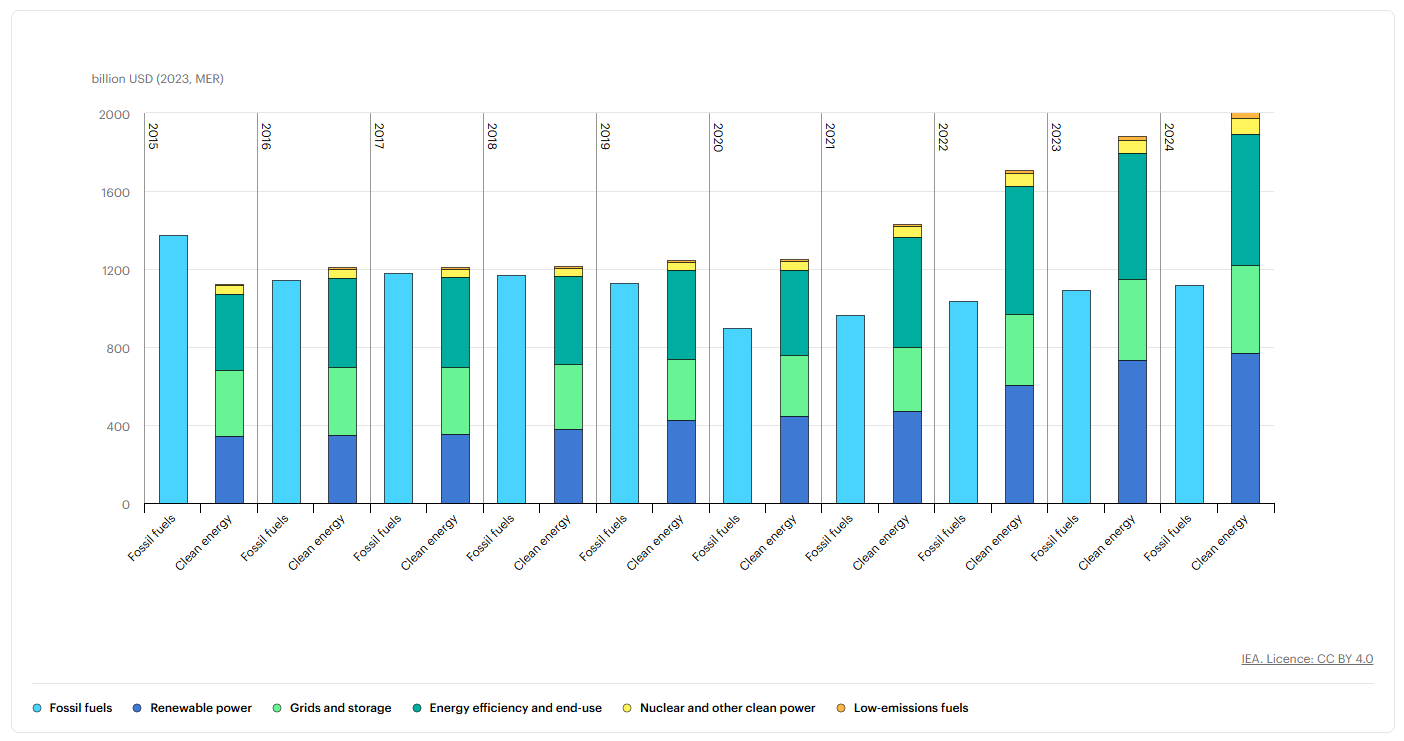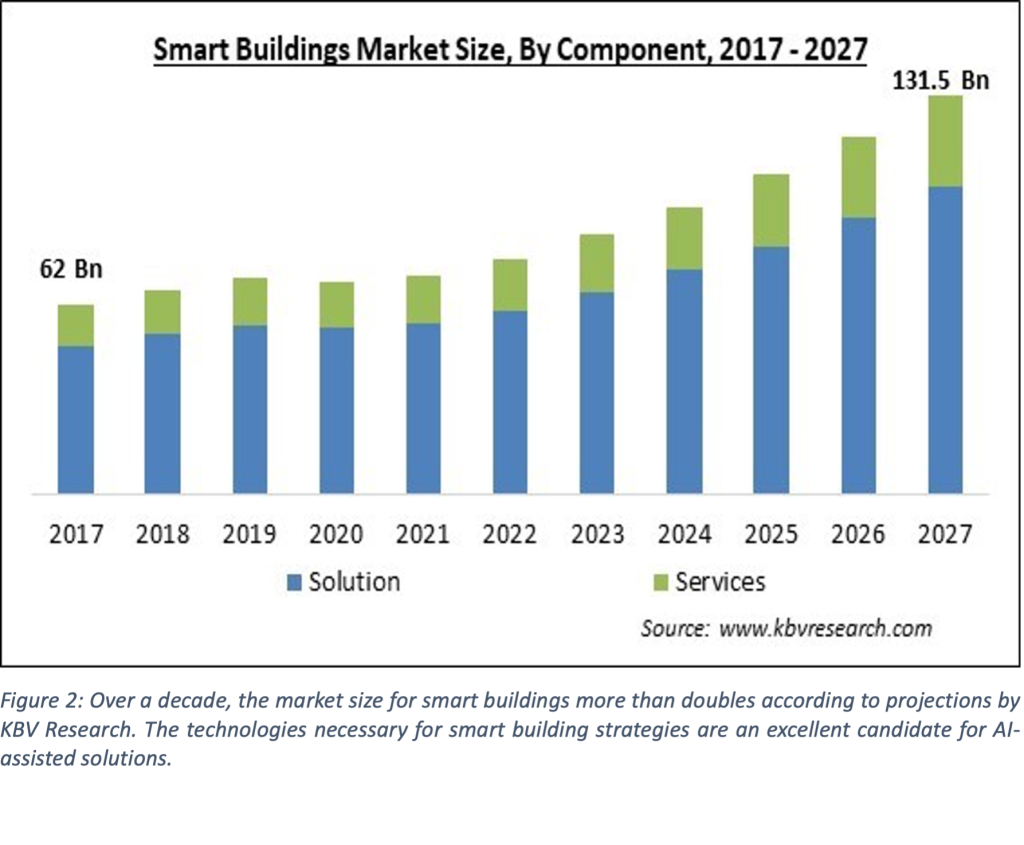As we explore the impact of artificial intelligence, or AI, on investment opportunities, it is necessary to recognize prospects complemented by the significant technological advancements in the renewable energy sector. The market potential for AI in the alternative energy sector is immense, driven by the energy sector’s urgent need for innovative solutions that increase energy production efficiency and reduce costs for manufacturers and other customers.
The International Energy Agency (IEA) has stated that the renewable energy market is projected to exceed $2 trillion by the end of this year (Fig. 1), and we expect this trend to continue for the years to come.(1) While demand for renewable energy sources continues to rise and its permanent integration becomes more certain, the realization of this market potential is greatly accommodated through the integration of AI technologies. The wind engineering industry is making significant strides by employing sophisticated AI-assisted algorithms to optimize wind turbine operations, with some firms reporting increases in energy production of up to 10% through real-time data analysis. As these innovative technologies gain traction, the sector is likely to see enhanced energy yields and a stronger competitive position, highlighting the substantial market potential in the future of sustainable energy.
While energy production strategies often take center stage in discussions about renewable energy, energy storage systems are a critical component of the alternative energy sector that frequently gets overshadowed. Battery storage systems play a vital role in optimizing energy supply and demand, ensuring the effectiveness of renewable sources. According to SNS Insider, the demand for reliable energy storage solutions is projected to reach $54 billion by 2032, growing at an annual rate of approximately 27%.(2) The energy storage industry is rapidly expanding, with companies increasingly utilizing AI to optimize their systems, leading to substantial adoption and significant year-over-year sales growth. By enhancing energy efficiency and advancing innovative technologies, this sector is establishing a strong position in the market, underscoring the potential for growth in the future of sustainable energy.
As businesses increasingly prioritize sustainability, the global smart building market is projected to reach $1.3 Billion by 2027 (Fig. 2), growing at an impressive annual rate of over 7.5%.(3) Smart buildings utilize advanced automation technologies to enhance environmental performance and provide superior security and comfort. The industry is at the forefront of transformation, leveraging AI in energy management systems to achieve greater efficiency and cost savings while addressing the rising demand for sustainable infrastructure.
The continuously evolving environment of the renewable energy sector provides a clear opportunity to integrate AI technologies that present investment opportunities. Companies that embrace these innovations are not only enhancing operational efficiency but also positioning themselves for long-term growth. For investors looking to capitalize on the future of sustainable energy, now is the time to consider the transformative potential of AI in this dynamic market.
Please reach out to your Baldwin Investment Advisor to discuss specific ways to add exposure to AI technologies in the energy sector to your portfolios.
Sources:
1 International Energy Agency (IEA). Global investment in clean energy and fossil fuels (2015-2024). Retrieved September 30, 2024, from https://www.iea.org/data-and-statistics/charts/global-investment-in-clean-energy-and-fossil-fuels-2015-2024
2 SNS Insider. (2024, September 24). Battery energy storage system market to cross USD 54.28 billion at 26.61% CAGR by 2032 driven by renewable energy adoption: Report by SNS Insider. GlobeNewswire. Retrieved from https://www.globenewswire.com/news-release/2024/09/24/2952314/0/en/Battery-Energy-Storage-System-Market-to-Cross-USD-54-28-Billion-at-26-61-CAGR-by-2032-Driven-by-Renewable-Energy-Adoption-Report-By-SNS-Insider.html
3 KBV Research. Smart buildings market – Analysis of market size & trends. Retrieved September 30, 2024, from https://www.kbvresearch.com/smart-buildings-market/#:~:text=Analysis%20of%20Market%20Size%20%26%20Trends,CAGR%20during%20the%20forecast%20period.
The opinions expressed in this Commentary are those of Baldwin Investment Management, LLC. These views are subject to change at any time based on market and other conditions, and no forecasts can be guaranteed. The reported numbers enclosed are derived from sources believed to be reliable. However, we cannot guarantee their accuracy. Past performance does not guarantee future results. We recommend that you compare our statement with the statement that you receive from your custodian. A list of our Proxy voting procedures is available upon request. A current copy of our ADV Part II & Privacy Policy is available upon request or at www.baldwinmgt.com/disclosures.

Joe hails from Wilmington, Delaware, where he spent most of his life. He earned his undergraduate degree in finance from Temple University before furthering his education with a graduate degree in investment management, also from Temple University. Holding the CFA charter, which he achieved in 2022, Joe aligns with the caliber of professionals at Baldwin.
Before joining Baldwin, Joe served as the Director of Investments for a financial advisory firm at Northwestern Mutual in Albuquerque, New Mexico. His passion for all facets of the market drives him to dedicate substantial time researching, analyzing, and forecasting investment opportunities. Moreover, Joe finds fulfillment in working with clients, guiding them towards financial freedom through meticulous long-term investment strategies.
Outside of his professional pursuits, Joe indulges in golfing, outdoor activities, and competes in strongman weightlifting competitions. His favorite financial quote is, “The market can remain irrational longer than you can remain solvent.”


